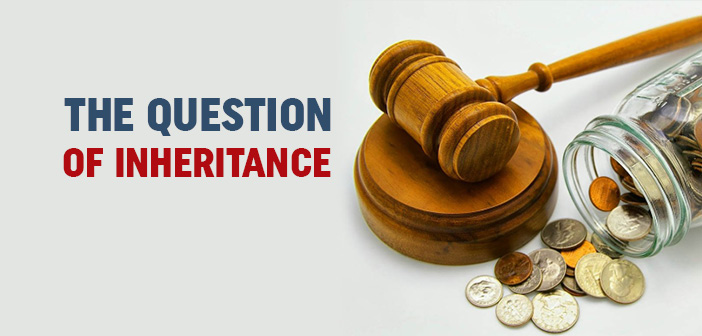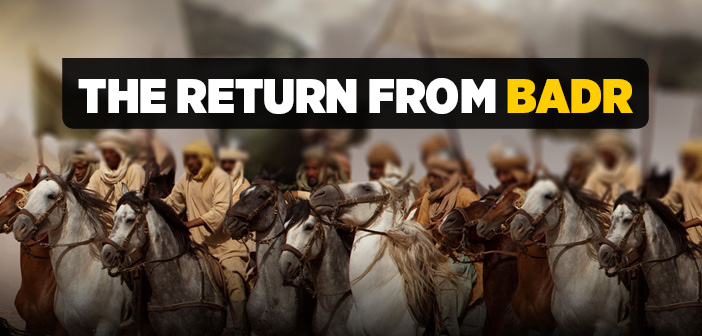What is inheritance in islam? What is the question of inheritance?
Certain ayat had in the meantime been revealed concerning the issue of inheritance, as some confusion had emerged following Uhud. Following the martyring of Saad ibn Rabi -Allah be well-pleased with him- at Uhud, in accordance with the practice common to the Age of Ignorance, his brother seized all of whatever remained of his wealth, without leaving anything to Saad’s two daughters. Considered of little worth during the time of Ignorance, females were not given rights over inheritance; an unjust practice put an end to by Islam:
“Allah enjoins you concerning your children: The male shall have the equal of the portion of two females; then if they are more than two females, they shall have two-thirds of what the deceased has left, and if there is one, she shall have the half; and as for his parents, each of them shall have the sixth of what he has left if he has a child, but if he has no child and (only) his two parents inherit him, then his mother shall have the third; but if he has brothers, then his mother shall have the sixth after (the payment of) a bequest he may have bequeathed or a debt; your parents and your children, you know not which of them is the nearer to you in usefulness; this is an ordinance from Allah: Surely Allah is Knowing, Wise.” (an-Nisa, 11)
Thus the first ever distribution of inheritance in Islam was made between the inheritors of Saad ibn Rabi -Allah be well-pleased with him-.[1]
The Islamic law of inheritance seeks a just balance between the allotted shares and the responsibilities of the inheritor. Men, who, come under heavier financial responsibilities, ranging from the wedding expenses and the payment of mihr to supporting the family economically thereafter, have thus been allotted a greater share than women. In other words, the difference between males and females existent within the considerations of Islamic law are strictly consequent upon their difference of duties and responsibilities. Owing to their role of keeping an eye over the young and the connected need of taking care of the children and the family, women are exempt from supporting the family financially. For that reason, their share of inheritance is half of that of men. Behind the share of inheritance women receive is a consideration of what personal needs they may have; like supporting unmarried or divorced women in making their ends meet.
Women have been furthermore blessed with a depth of feeling, sensitivity, mercy and self-sacrifice, ideal for nurturing children and taking the family under their wings of compassion. Being delicate by nature, with refined feelings of sensitivity and boasting an almost bottomless depth of mercy, women may therefore tend to give way to physical and mental weakness when encountered by the surprises life tends to offer. Only for such reason does a woman, in Islam, hold the status of ‘half a witness’. Those who see this as an excuse to attack Islam are simply unable to see, either from their thick veil of malice or from crass ignorance, the perfection in this principle that has its incentive in a few very important and unalterable considerations pertaining to human disposition.
The truth is that Allah, glory unto Him, has created each being, including each and every particle of that being, for a purpose, in line with which He has endowed it with a suitable physical and spiritual structure. Placing man under the obligation of providing for the family, in order for them to see to that task in a manner most befitting, the Almighty has generally fashioned men with greater physical strength and spiritual fortitude. Women, on the other hand, have been entrusted with the duty of protecting the children, raising and safeguarding them and seeing to their needs when they are in their weakest and most vulnerable state. Their specific duties have required their souls, not their bodies, to be endowed with deeper feelings of sensitivity. Such that, in order to embrace and nurture children with a profound love and compassion during their most vulnerable phases, as a Divine gift, women are given refined emotions of sensitivity. Only a negative outcome will emerge if the mother, a virtual fount of mercy through her precious configuration, is burdened with a task beyond her power and reason of creation.
Owing to these considerations, it could also be stated that there is a higher probability of a female misleading justice, by showing excess sympathy for the culprit. This is the exact wisdom lying beneath the Divine decree, which holds the testimonies of two female witnesses to count as one.
On the other hand, Islam regulates the process of testifying before law in close accordance with the psychological structures of human beings. For instance, the testimony of women alone is considered sufficient in specific circumstances involving incidents impossible for males to witness.[2]
Those who use the question of the testimony of women as a pretext to indict Islam with holding a lower opinion of women, either fail to understand or do not even wish to understand that Islam, by virtue of taking into consideration the unchangeable predispositional nature of human beings, as well as the entire community, in establishing a balance of justice between rights and responsibilities, could never be further remote from such unfounded allegations.
Femininity is perfected through the protection and promotion of the wonderful capacities women have been given by the Almighty. If a woman directs her natural capabilities in the opposite direction of Divine resolve and bids farewell to her own reality, she will end up squandering all her worth, and in consequence will lose her inner peace, falling into despondency and misery. Worse still, the sanctuary that is the family will become derelict, and the fiber of society, in turn, will wither away.
Our age has seen the commencing of an artificial and unjust race for equality between men and women. In total defiance of the natural characteristics of women, the race strikes a major blow directly at the heart of the feminine qualities of women, including motherhood, and is consequently detrimental to the family institution. The unfortunately common contemporary practice of abortion, which is an upshot of this race, is the modern version of the practice of burying the female children alive so common in the Age of Ignorance. A mere difference of clothing is the only thing that separates the fatigued and lethargic women of our times from those of the Age of Ignorance. Without a doubt, this is a social catastrophe brought on by a spiritless, materialistic education.
[1] Ahmad, III, 352, 375. [2] Mecelle, article. 1685.
Source: Osman Nuri Topbaş, The Prophet Muhammed Mustafa the Elect II, Erkam Publications





